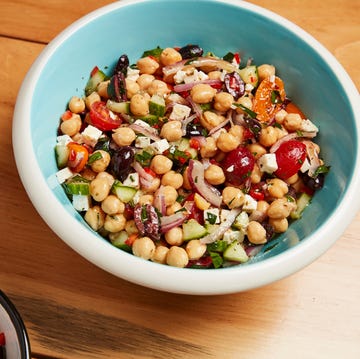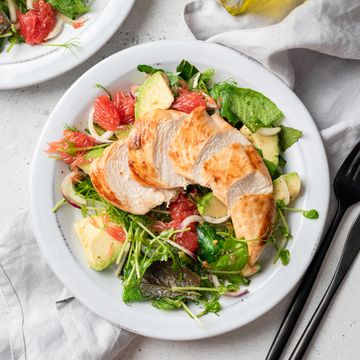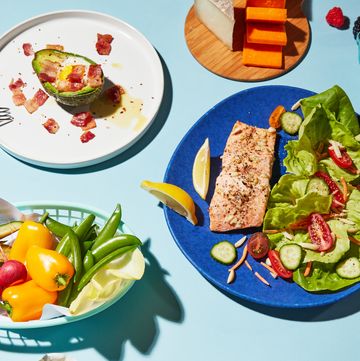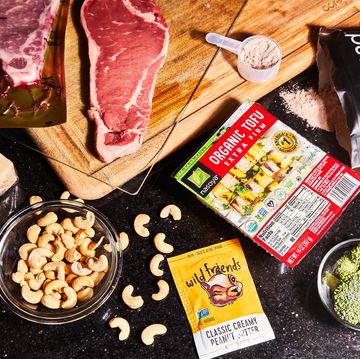Most runners strive for a well-balanced diet, but even conscientious eaters can miss out on key nutrients. If your meal plan doesn't contain a perfect balance of every performance-enhancing vitamin—and, really, whose does?—you may benefit from popping a pill or two. "It's always best to eat whole foods, since they supply nutrients in combinations pills can't replicate," says sports dietitian Molly Morgan, R.D. "But taking certain supplements can help ensure runners get everything active people need." Here's how to decide whether your diet needs a boost from some of the most common pills runners pop.
CALCIUM: "Calcium reduces stress-fracture risk by strengthening bones," says Morgan, "and plays a key role in muscle and nerve function." A study in the American Journal of Clinical Nutrition found people with high calcium intake have a lower risk of developing type-2 diabetes. If you eat at least three daily servings of dairy, you probably have enough calcium in your diet. But if you regularly fall short, supplementing is a good idea, says Morgan.
HOW TO POP IT: Take 1,000 mg of calcium citrate or calcium carbonate daily, says Morgan (women 51 or older need 1,200 mg). To boost absorption, take it in two doses at meals a few hours apart.
FISH OIL: Studies show EPA and DHA, the omega-3 fatty acids in fish oil, help reduce exercise-induced asthma and muscle soreness and increase lean body mass. Both are in fatty fish, like salmon and sablefish. "If you eat two or three servings of fatty fish a week, you get plenty of omegas," says Cassandra Forsythe, R.D., Ph.D. But if you're among the 65 percent of runners who rarely or never eat seafood, according to a runnersworld.com poll, supplements are a good choice.
HOW TO POP IT: A supplement with 1,000 mg of fish oil may actually contain little DHA and EPA. "Read the label," says Forsythe, "and find one that contains at least 500 mg of DHA and EPA combined."
IRON: "Iron is vital for producing hemoglobin, a compound that carries oxygen to muscles," says Diane DellaValle, R.D., who's studied the mineral's role in exercise. "Low iron causes energy to sag and affects performance." Men rarely have low iron, but research shows premenopausal female runners are at risk. Women who feel tired and weak may need a supplement, but since high doses of iron can damage organs, DellaValle stresses runners should consult a doctor before supplementing.
HOW TO POP IT: If a blood test reveals you have low iron, take ferrous sulfate. "It's well absorbed and tolerated by most people," says DellaValle. Pair it with vitamin C-rich foods to boost absorption.
MULTIVITAMIN: A 2007 study in the American Journal of Clinical Nutrition found 35 percent of adults swallow multivitamins. Another recent study reported long-term takers are less likely to have heart attacks. So should you pop? "If you're healthy and eat a variety of whole foods, you probably won't benefit from a multi," says Morgan. "If you struggle to eat all the food groups, it can fill nutritional gaps." Morgan adds a multi may also help during hard training, when some nutrient needs increase.
HOW TO POP IT: Pick one with 100 percent of the Daily Value for most vitamins and minerals, but avoid excesses. High doses of some nutrients can be dangerous. Humidity affects potency, so keep pills out of the kitchen and bathroom.
VITAMIN D: The body needs vitamin D to absorb calcium, making it vital for bone health. That's why the Institute of Medicine recently raised its recommended daily intake from 200 international units (IU) to 600 IU for most age groups. Newer research has also linked vitamin D to lower risk for heart disease, breast cancer, and diabetes. But getting enough is difficult since it's in few foods and our bodies only make it when exposed to UV rays. "Generally, most runners could benefit from a vitamin D supplement," says Forsythe.
HOW TO POP IT: Forsythe recommends getting your vitamin D level tested. "If you fall below 30 ng/ml, take at least 1,000 IU of vitamin D3 daily." Pair it with your largest meal to increase absorption.
WHEY PROTEIN: Isolated from cow's milk, whey protein is a rich source of all the amino acids muscles need. Studies show it helps build lean body mass and increase strength. But its main advantage over other protein supplements, such as soy and casein, is that it's very quickly absorbed by the body, "which makes it an excellent choice for postrun recovery," says Forsythe. Runners who struggle to eat enough protein after workouts may want to try adding whey to recovery meals, says Forsythe.
HOW TO POP IT: A Canadian study found 10 grams (or two tablespoons) of whey isolate boosts muscle protein synthesis postexercise. Add it to smoothies, oatmeal, pancake batter, and yogurt.
EAT BETTER: When buying multivitamins, check the bottle for the NSF mark—a guarantee the product delivers what it says and is free of contaminants.
Push Back
Pills that aren't effective—and may actually be dangerous
ACAI
This fruit is high in antioxidants. But reports that acai extract speeds weight loss are unfounded—not a single study backs up this claim.
BETA-CAROTENE
When consumed through fruits and vegetables, beta-carotene may reduce risk for some cancers. But research shows taking high doses in supplements may raise risk for certain cancers and even death.
RESVERATROL
Research shows this red wine antioxidant is linked to a lower risk of heart disease. But it's not clear whether resveratrol itself or a combination of nutrients is actually at play.
QUERCETIN
Research using mice found some evidence the flavonoid (found in apples and onions) may boost athletic performance, but studies with people found no such effect.
VITAMIN E
Studies have found the vitamin does not reduce risk for heart disease or cancer. In fact, Harvard researchers found supplementing may raise stroke risk. Stick with natural sources, like nuts, avocado, and olive oil.












